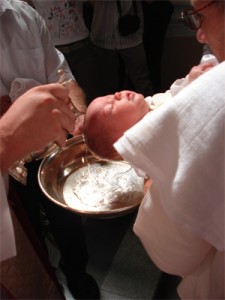
Rules, Rules, Rules
For those of you who are parents I ask, “Do you set rules for your children?” And if so, “why?” If your answer is no, then society would most likely deem you an unfit parent. Of course, you give them the freedom to make certain decisions, but there have to be guidelines, right? I would assume that you do set rules for your children, because you want what’s best for them. It’s not to prove your power over them or to give you a reason to punish them, but rather it’s a way for you to help them become the “best-version-of-themselves.” After all, we live in a confused world that will tell them to go against everything you say, but through the rules that you set for them they will stand a fighting chance against it. Those rules will save their lives.
As our Heavenly Father, God wants what’s best for us, His children. I don’t think anyone would disagree with that. As a Father, He must set rules for us, not to impose His power over us—after all, He has given us the free will to make our own decisions—but rather to guide us down the right path to becoming the “best-version-of-ourselves.” Out of love He gives us rules, laws, and commandments. He knows us better than we know ourselves. What better guide could we have?
For Our Benefit
Many times in the Gospels Jesus is confronted by the Pharisees for doing work on the Sabbath. For example, there is the time He and the disciples were picking grain and the time He healed the man with the withered hand on the Sabbath. This is where we hear the famous line:
“The sabbath was made for man, not man for the sabbath.” ~ Mark 2:27
The Pharisees in these instances were angry that Jesus was breaking the Law of the Sabbath. That Law stated that the Sabbath was a day of rest to be dedicated to the Lord. Jesus isn’t telling them not to rest or not to worship God, but He’s making another point. Rest is important and it is meant to restore us both physically and spiritually. Our busy lives can often get the best of us and we need a break from that routine. But if for example someone needs your help on your day off, do you heed the call or do you do nothing because you’re off today? If an off-duty cop sees a crime in progress should he walk away and pretend as if he saw nothing? Of course not. We all have a duty to care for ourselves, our families, and one another.
This is why it’s important to understand that the Law is made for us, for our benefit. God doesn’t love us because we follow His rules, but He gives us rules to follow because He loves us. Parents give their children chores so they can learn the concept of work, pets so they can learn about responsibility, and sports so they can learn team work and discipline. Some of these activities are more fun than others, but they all serve a purpose.

The same is true for our religious practices. For example, God told the Israelites to slaughter animals, pour out their blood, then burn them, and eat their meat (Ex 29:10-40). That was a commandment and they followed it. You wouldn’t tell God that you’re squeamish at the sight of blood and that you decline to follow this rule. If you were to maintain your good relationship with God, then you were going to get your hands dirty. Of course, there must’ve been a reason for this commandment. The Israelites had just been freed from slavery under the Egyptians and the Egyptians worshipped their own gods who just happened to be animals. So what better way to show the Israelites, and the world, that the God of Israel is the supreme God, than to slaughter these animals which the Egyptians worshipped and offer them up to God? Every rule, law, and commandment is put in place for a reason. Not to make our lives more difficult, but always to bring us closer to God.
Jesus Told Me To
If you asked me why as a Catholic I practice my faith so religiously, I’d say, without second thought, “because Jesus told me to.” Jesus didn’t say “just love me and you’ll go to Heaven.” He also didn’t tell us that the Law was “old school” or to stop observing it. In fact, He told many of the people He healed to go to the priests and offer sacrifices.
“Then Jesus said to him, ‘See that you tell no one, but go show yourself to the priest, and offer the gift that Moses prescribed; that will be proof for them.'” ~ Matthew 8:4

Although it might sound strange to the non-religious, Jesus himself was a religious man. He was a practicing Jew who knew the Scriptures—which in His time were the Old Testament writings—and observed the law. As a baby He was circumcised, then presented in the temple (Lk 2:21-24). He went to synagogue on a regular basis and made pilgrimage to the temple in Jerusalem to offer sacrifice (Lk 2:41-52). He observed the Passover and other Jewish feasts (Mt 26:17-30). For a Catholic this is not foreign at all. These rituals and religious practices are all part of being Catholic. Catholics keep many of these things alive, although some things have changed from the Old to the New. For example, infant circumcision has given way to infant baptism and the feast days of saints and special holy days have taken the place of the Jewish feasts. In a Catholic church you will find incense, holy water, candles, priests, an altar, and a tabernacle, all of which have come from Judaism.
A Continuation of the Faith
Jesus condemned many religious people during His ministry, but not merely because they were religious. He condemned them because they were letting their observance of the Law and their religious customs take precedence over their relationship with God and their duty to love one another. He never says that Judaism is failed, in fact He says the exact opposite to the Samaritan Woman at the well:
“You people worship what you do not understand; we worship what we understand, because salvation is from the Jews.” ~ Jn 4:22
Christianity is a continuation of biblical Judaism. There wasn’t a clean break between Judaism and Christianity after Jesus died and rose again. In fact, there was all kinds of discussion about it (Acts 15:1-21). But for that reason, Jesus didn’t just leave his disciples with no idea of what to do next. He gave them authority (Mt 16:13) and the gifts of the Spirit (Jn 20:19-23) to assure that the Gospel would spread throughout the world (Mt 28:16). This visible, physical Church with leaders and hierarchy is the reason Christianity has survived for nearly 2000 years and the reason I can say that I am religiously Christian as a member of the one, holy, catholic, and apostolic Church founded by Jesus Christ.